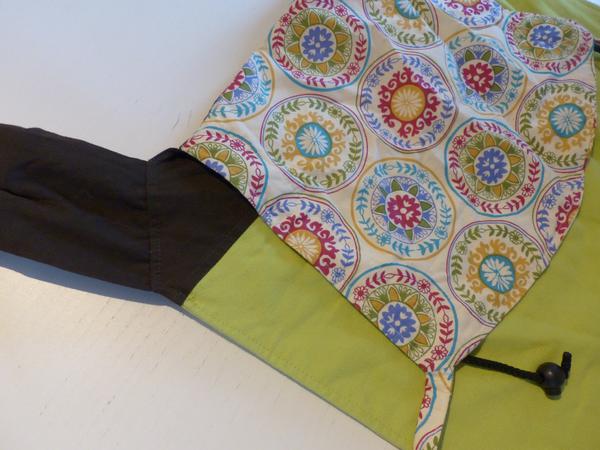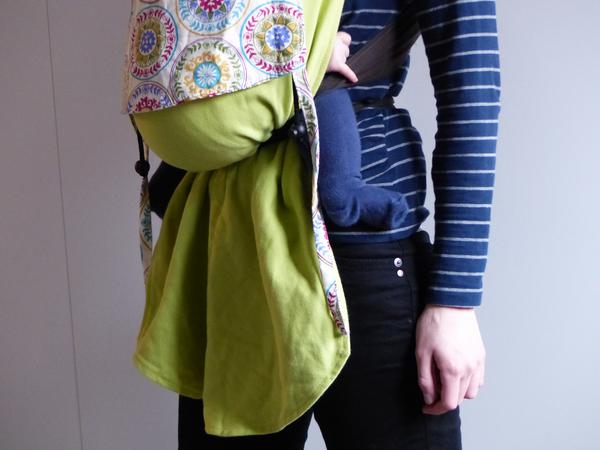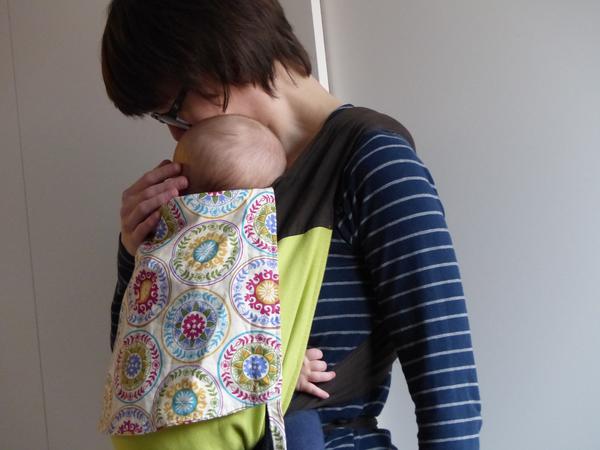Baby Roo Piggyback Podaegi
The Podaegi is a classic carrying aid from Korea. An adapted version of the Podaegi is now also available in the West from various manufacturers. These are similar only in the basic features of the original variant. One of these manufacturers is Baby Roo, which I could test extensively.
About the manufacturer
The company Baby Roo was founded in 2007 by Berit Kessler. The owner is herself a babywearing consultant. On the website I can read that all piggyback carriers meet the criteria for ergonomic carrying and should also provide a high wearing comfort. They are produced in Europe.
In addition to the tested Podaegi, there are several other carriers such as a full-buckle, Onbuhimo or Mei Tai. In addition, wish desgins can also be implemented.
About the baby carrier

The Podaegi is a carrying aid without a belly strap. The back part is a very long piece of fabric, so it always adapts to the size of the baby. The belly strap is ultimately created by crossing the straps under the bottom, knotting them at the back (when worn in front of the belly). The bar width is also fixed by tying the straps and flexibly adapts to the baby.
The straps of Baby Roo 's Piggyback Podaegis are soft but relatively thickly padded. The head support is gatherable and can be attached to the straps with loops.
Price-wise, the carrier is priced at 108€ in Baby Roo 's store. This puts it in the mid to low price range of baby carriers.
In the test


I tested the Huckepack Podaegi mainly with my daughter. In the process, I tried it both in front of the belly and on the back. The bar width always adapts optimally to the size of the child with this type of carrier. The height of the back section can also be flexibly regulated, with the sides being pulled down tightly. My daughter's head was not always perfectly supported, as the neck area is relatively wide.
Tying it takes a bit of practice, because the carrier really isn't completely tight until the end. Once properly tied, however, I found it really very comfortable on the shoulders. The padding was comfortable. The abdominal strand of the straps was a little unusual at first, but then did not bother me further. Even when wearing for a long time, I noticed no pressure points.
I would only recommend back carrying with the Podaegi with children who are experienced in carrying. Also with fidgety babies could be difficult to tie. Also, the baby should already have head control because he is not well supported until the end of the tying process.
Washing
I only hand washed the carrier and had no problems at all. However, machine washing should not be a problem either.
Conclusion
I think the price-performance ratio of the Piggyback Podaegis by Baby Roo is very good. Tying it may require some practice at first, but then goes easily and quickly. For fidgety children I find this type of carrier not so suitable. Otherwise, carrying with the Podaegi is really very comfortable, even over a long period of time. It is nice that the width of the bar and the height of the back section can always be flexibly adjusted to the child.